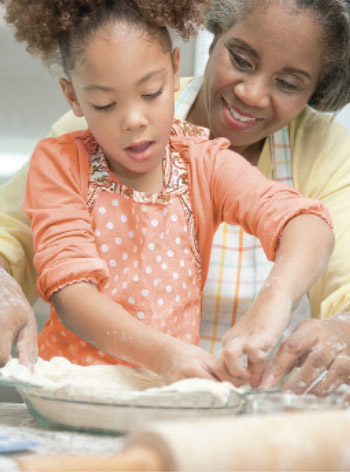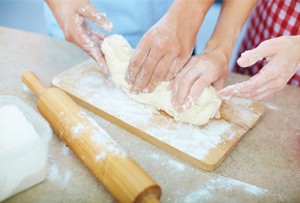Why Cook?
This article was originally published in November 2013
What made us human?
I believe the transformative moment that gave rise to the genus Homo, one of the great transitions in the history of life, stemmed from the control of fire and the advent of cooked meals. Cooking increased the value of our food. It changed our bodies, our brains, our use of time, and our social lives.
— Richard Wrangham, Harvard anthropology professor and author of “Catching Fire: How Cooking Made us Human”

This article excerpted from “Cooked: A Natural History of Transformation” by Michael Pollan (Penguin, 2013)
The idea that cooking is a defining human activity is not a new one. In 1773, the Scottish writer James Boswell, noting that “no beast is a cook,” called Homo sapiens “the cooking animal.” (Though he might have reconsidered that definition had he been able to gaze upon the frozen-food cases.)
Fifty years later, in the “Physiology of Taste,” the French gastronome Jean Anthelme Brillat-Savarin claimed that cooking made us who we are; by teaching men to use fire, it had “done the most to advance the cause of civilization.” More recently, Claude Lévi-Strauss, writing in “The Raw and the Cooked” in 1964, reported that many of the world’s cultures entertained a similar view, regarding cooking as the symbolic activity that “establishes the difference between animals and people.”
For Lévi-Strauss, cooking was a metaphor for the human transformation of raw nature into cooked culture. But in the years since the publication of “The Raw and the Cooked,” other anthropologists have begun to take quite literally the idea that the invention of cooking might hold the evolutionary key to our humanness.
A few years ago, a Harvard anthropologist and primatologist named Richard Wrangham published a fascinating book called “Catching Fire,” in which he argued that it was the discovery of cooking by our early ancestors — and not tool making or meat eating or language — that set us apart from the apes and made us human.
According to the “cooking hypothesis,” the advent of cooked food altered the course of human evolution. By providing our forbears with a more energy-dense and easy-to-digest diet, it allows our brains to grow bigger (brains being notorious energy guzzlers) and our guts to shrink. It seems that raw food takes much more time and energy to chew and digest, which is why other primates our size carry around substantially larger digestive tracts and spend many more of their waking hours chewing — as much as six hours a day.
Cooking, in effect, took part of the work of chewing and digestion and performed it for us outside the body, using outside sources of energy. Also, since cooking detoxifies many potential sources of food, the new technology cracked open a treasure trove of calories unavailable to other animals.
Freed from the necessity of spending our days gathering large quantities of raw food and then chewing (and chewing) it, humans could now devote their time, and their metabolic resources, to other purposes, like creating a culture.
Cooking and culture
Cooking gave us not just the meal but also the occasion: the practice of eating together at an appointed time and place. This was something new under the sun, for the forager of raw food would have likely fed himself on the go and alone, like all the other animals. (Or, come to think of it, like the industrial eaters we’ve more recently become, grazing at gas stations and eating by ourselves whenever and wherever.) But sitting down to common meals, making eye contact, sharing food, and exercising self-restraint all served to civilize us. “Around that fire,” Wrangham writes, “we became tamer.”
Cooking thus transformed us, and not only by making us more sociable and civil. Once cooking allowed us to expand our cognitive capacity at the expense of our digestive capacity, there was no going back: our big brains and tiny guts now depended on a diet of cooked food. (Raw-foodists take note.) What this means is that cooking is now obligatory — it is, as it were, baked into our biology.
What Winston Churchill said of architecture — “First we shape our buildings, then they shape us”— might also be said of cooking: First we cooked our food, then our food cooked us.

Decline of cooking
If cooking is as central to human identity, biology and culture as Wrangham suggests, it stands to reason that the decline of cooking in our time would have serious consequences for modern life, and so it has. Are they all bad? Not at all. The outsourcing of much of the work of cooking to corporations has relieved women of what traditionally has been their exclusive responsibility for feeding the family, making it easier for them to work outside the home and have careers.
It has relieved all sorts of other pressures in the household, including longer workdays and overscheduled children, and saved us time that we can now invest in other pursuits. It also has allowed us to diversify our diets substantially, making it possible even for people with no cooking skills and little money to enjoy a whole different cuisine every night of the week. All that’s required is a microwave.
These are no small benefits. Yet they have come at a cost that we are just now beginning to reckon. Industrial cooking has taken a substantial toll on our health and well-being.
Corporations cook very differently from how people do (which is why we usually call what they do “food processing” instead of cooking). They tend to use much more sugar, fat and salt than people cooking for people do; they also deploy novel chemical ingredients seldom found in pantries in order to make their food last longer and look fresher than it really is. So it will come as no surprise that the decline in home cooking closely tracks the rise in obesity and all the chronic diseases linked to diet.
The rise of fast food and the decline of home cooking also have undermined the institution of the shared meal, by encouraging us to eat different things and to eat them on the run and often alone. Survey researchers tell us we’re spending more time engaged in “secondary eating,” as this more or less constant grazing on packaged foods is now called, and less time engaged in “primary eating” — a rather depressing term for the once-venerable institution known as the meal.
The communal table
The shared meal is no small thing: it is a foundation of family life, the place where our children learn the art of conversation and acquire the habits of civilization: sharing, listening, taking turns navigating differences, arguing without offending. What have been called the “cultural contradictions of capitalism” — its tendency to undermine the stabilizing social forms it depends on — are on vivid display today at the modern dinner table, along with all the brightly colored packages that the food industry has managed to plant there.
“We’ve had a hundred years of packaged foods,” a food marketing consultant told me, “and now we’re going to have a hundred years of packaged meals.” This is a problem — for the health of our bodies, our families, our communities and our land, but also for our sense of how our eating connects us to the world.
Our growing distance from any direct, physical engagement with the processes by which the raw stuff of nature gets transformed into a cooked meal is changing our understanding of what food is. Indeed, the idea that food has any connection to nature or human work or imagination is hard to credit when it arrives in a neat package, fully formed. Food becomes just another commodity, an abstraction.
Cooking — of whatever kind, everyday or extreme — situates us in the world in a very special place, facing the natural world on one side and the social world on the other. The cook stands squarely between nature and culture, conducting a process of translation and negotiation. Both nature and culture are transformed by the work. And in the process, I discovered, so is the cook.
Cooking has the power to transform more than plants and animals: it transforms us, too, from mere consumers into producers. Not completely, not all the time, but I have found that even to shift the ratio between these two identities a few degrees toward the side of production yields deep and unexpected satisfactions.
Cooking, I found, gives us the opportunity, so rare in modern life, to work directly in our own support, and in the support of the people we feed. If this is not “making a living,” I don’t know what is.
In the calculus of economics, doing so may not always be the most efficient use of an amateur cook’s time, but in the calculus of human emotion, it is beautiful even so. For is there any practice less selfish, any labor less alienated, any time less wasted, than preparing something delicious and nourishing for people you love?
Reprinted by arrangement with The Penguin Press, a member of Penguin Group (USA) LLC, A Penguin Random House Company. Copyright © Michael Pollan, 2013.
